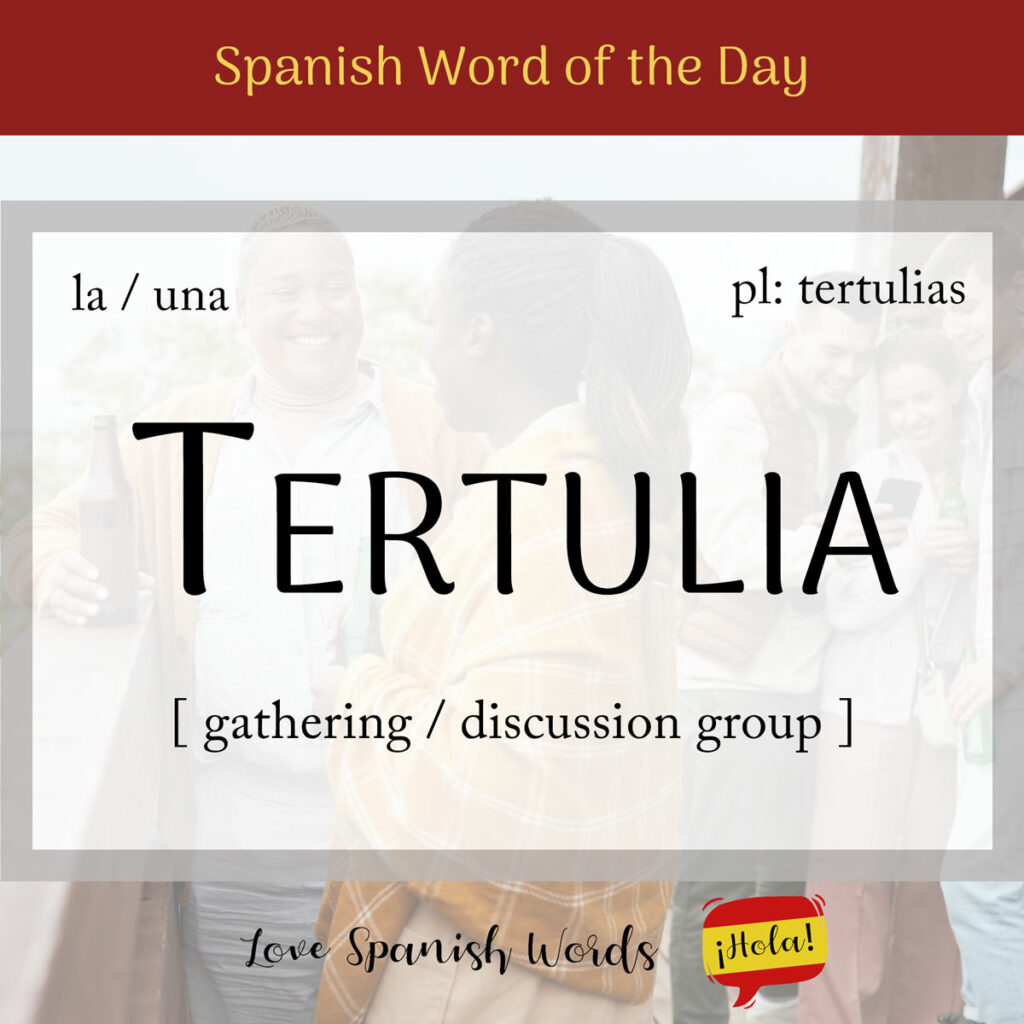There’s nothing I enjoy more than spending time with my friends, chatting for hours about all kinds of topics. In Spanish, we’d call these gatherings tertulias, which perfectly captures the lively, meaningful conversations we share.
The word tertulia is believed to have originated from the name of a Roman philosopher and Christian writer, Tertullian (Tertuliano in Spanish), who lived in the 2nd century AD. He was known for his intellectual debates and writings on theology, which may have inspired the use of his name to describe gatherings for discussion.
Latin American Pronunciation
European Pronunciation

Tertulia is a feminine noun in Spanish. It uses the feminine articles:
- la tertulia = the gathering
- las tertulias = the gatherings
- una tertulia= a gathering
- unas tertulias = some gatherings
In early usage, the term referred to meetings or debates about philosophical, theological, or literary topics, typically involving educated individuals. Over time, tertulia evolved to encompass a broader range of social meetings, no longer confined to intellectual circles.
El museo tendrá una tertulia acerca de la nueva exposición.
The museum will host a discussion about the new exhibition.

Nowadays, tertulia describes informal social gatherings, often in a relaxed setting like a café, someone’s home, or a cultural space, where participants engage in lively discussions. While traditionally centred around literature, art, or politics, a tertulia can focus on any topic of shared interest. Here are some types of tertulias:
- tertulias literarias: these are literary gatherings where writers, poets, and readers meet to discuss literature, read aloud, or critique each other’s works.
- tertulias de café: it refers to social gatherings in cafés, a common setting for tertulias in Spain and Latin America, where people meet to chat and exchange ideas over coffee.
- radio and TV tertulias: In modern times, the term has also been adapted to refer to radio or television talk shows, where hosts and guests discuss various topics.
This might sound similar to an academic conference. Still, a conferencia (conference) is a formal, structured event typically involving scheduled presentations, lectures, or panels in professional or academic settings, where attendees may primarily listen and learn. In contrast, a tertulia is an informal, intimate gathering where participants engage in open, relaxed conversación (conversation), often on intellectual or cultural topics, without a set agenda. While conferences focus on knowledge-sharing and networking with larger audiences, tertulias emphasise interacción social (social interaction) and exchanging ideas in a cozy, smaller setting.
¡Vamos a la tertulia en el café del parque!
Let’s go to the gathering at the park café!
Tertulias have played a crucial role in the cultural and intellectual life of Spain and Latin America. They have historically served as a space for free expression, creative collaboration, and the exchange of ideas among escritores (writers), artistas (artists), and pensadores (thinkers). In the 19th and early 20th centuries, literary tertulias were particularly influential, often held in cafés where famous writers and poets like Federico García Lorca, Pablo Neruda, and Jorge Luis Borges gathered to discuss their work and the political or social issues of the day.

Fun Fact:
One of the most famous historical venues for tertulias is Café Gijón, located in Madrid. Opened in 1888, it has hosted generations of writers, artists, and thinkers who gathered to exchange ideas and debate cultural issues.
Even today, tertulias continue to thrive in artistic and intellectual circles, both in traditional settings like cafés and in modern formats such as online forums and podcasts.

Expressions and idioms involving ‘tertulia‘
Hacer tertulia
Literal translation: to make a gathering
English meaning: the act of hosting or participating in a tertulia. It can also describe a long conversation.

